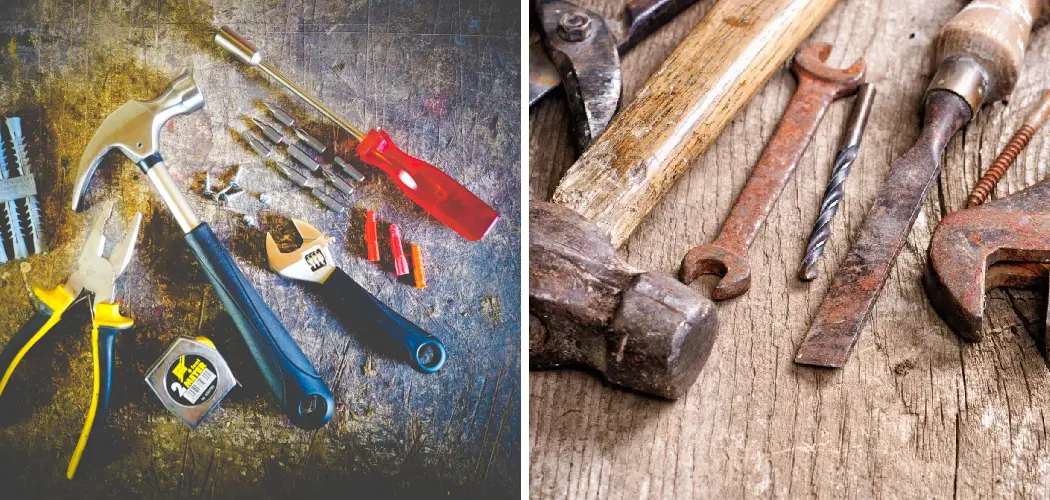Garage, the place where we store our cars and extra tools. But what happens when those tools start to rust? Here are a few ways on how to keep tools from rusting in garage. Rust is one of the biggest enemies of tools. It looks unsightly, but it can also cause damage to the metal and make the tool more difficult to use.
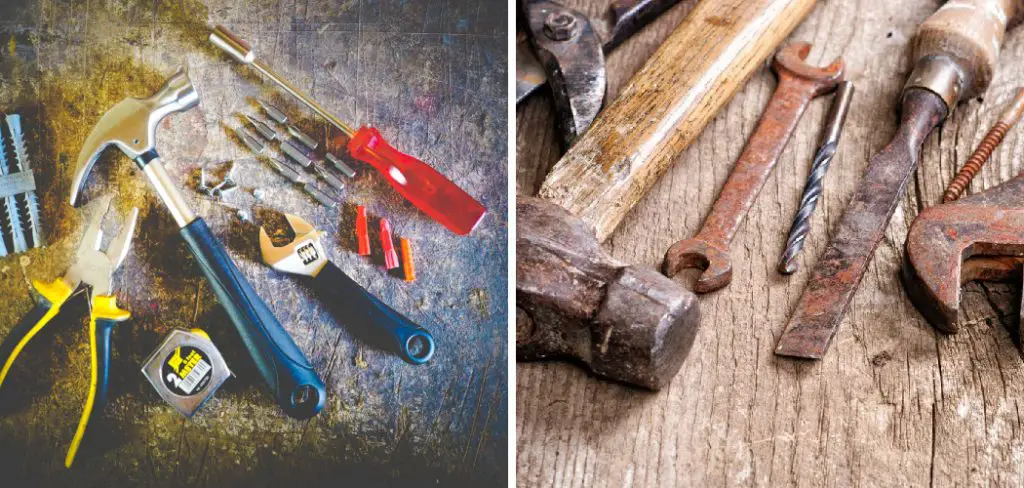
Fortunately, you can do a few things to prevent rust from taking over your garage. If you live in an area with high humidity, consider using a dehumidifier to keep the humidity levels down. Read on to know more!
Summary: If you want to keep your tools in good condition and prevent them from rusting, you can do a few things. First, make sure your garage or storage area is well-ventilated and dry. Moisture is one of the main causes of rust. Additionally, keep your tools clean and dry before storing them. You can apply a light coating of oil to metal surfaces or use a rust inhibitor to protect them.
10 Reasons That Causes Rust Build Up in Garage
1. Moisture and Humidity:
This is the most common cause of rust. When water vapor comes into contact with metal, it forms a corrosive chemical known as hydrogen-ion, which eats away at the metal. This is accelerated in the presence of oxygen.
2. Salt in the Air:
Salt not only corrodes metal but also hastens other materials’ corrosion process. Salt is used industrially to speed up the corrosion of metal. When iron or steel tools are exposed to salt air, they will rust quickly. If you live near the ocean, you should take extra care to protect your tools from rust. Store them in a dry place and oil them regularly if possible.
3. Poor Ventilation:
Good ventilation is key to keeping a garage free of rust. A well-ventilated garage will help remove moisture from the air, which will help prevent tools from rusting. If your garage does not have adequate ventilation, consider installing a fan or opening a window to allow fresh air in.
4. Lack of Maintenance:
Regularly cleaning and drying your tools is essential in preventing rust. Make sure to wipe down your tools after each use and store them in a dry place. If they do get wet, dry them off as soon as possible. In addition, you should oil your tools regularly to keep them from rusting.
5. Environmental Conditions:
Another factor contributing to rust is the environment in which your tools are stored. If you live in a humid climate, it’s important to take extra care of your tools to prevent rust. Ensure you store your tools in a dry place and avoid leaving them outside when it’s raining or snowing. You can also buy a tool storage shed or garage to keep your tools in, which will help protect them from the elements.
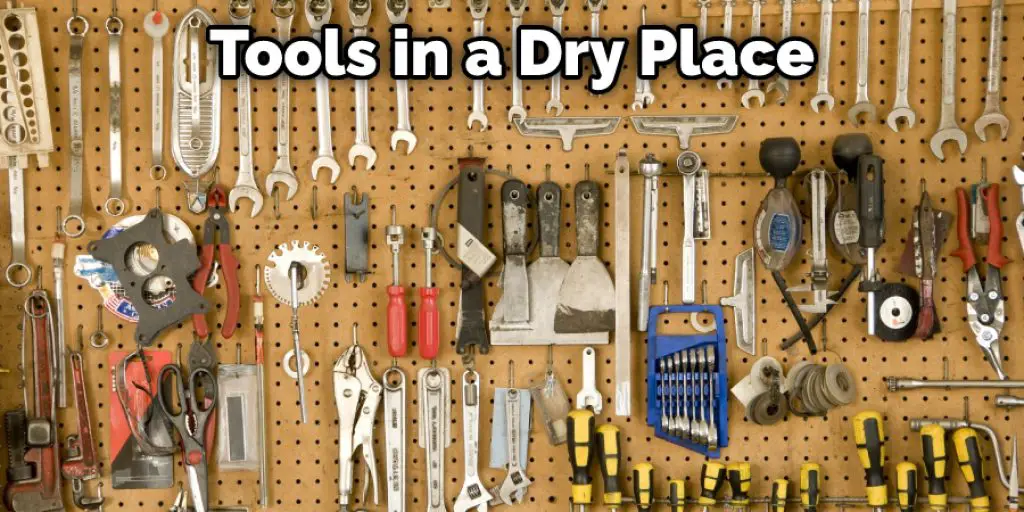
6. Condensation:
When warm air meets cold air, condensation forms. If this happens in your garage, it can cause your tools to rust. The best way to prevent condensation is to keep your garage warm. You can do this by insulating the walls and ceiling or installing a heater.
7. Chemicals:
Certain chemicals can cause rusting, even if they don’t directly contact the metal. For example, car exhaust contains sulfur dioxide, which will corrode iron and steel. So if you park your car in your garage, make sure to open the door to air out the exhaust fumes.
8. Acidic Materials:
Acidic materials, such as vinegar and lemon juice can also cause rust. If you use these materials in your garage, clean them up promptly and dry the area completely to prevent rust from forming.
9. Rust-prone Materials:
Some materials are more prone to rust than others. Iron and steel are especially susceptible, but even aluminum and copper can corrode under the right conditions. If you have rust-prone materials in your garage, take extra care to prevent them from coming into contact with moisture.
10. Poor Storage:
If you don’t store your tools properly, they may become rusty. Make sure to organize your garage and use tool storage racks or cabinets to keep your tools off the ground. This will help protect them from moisture and dirt and keep them from being damaged by other objects in the garage.
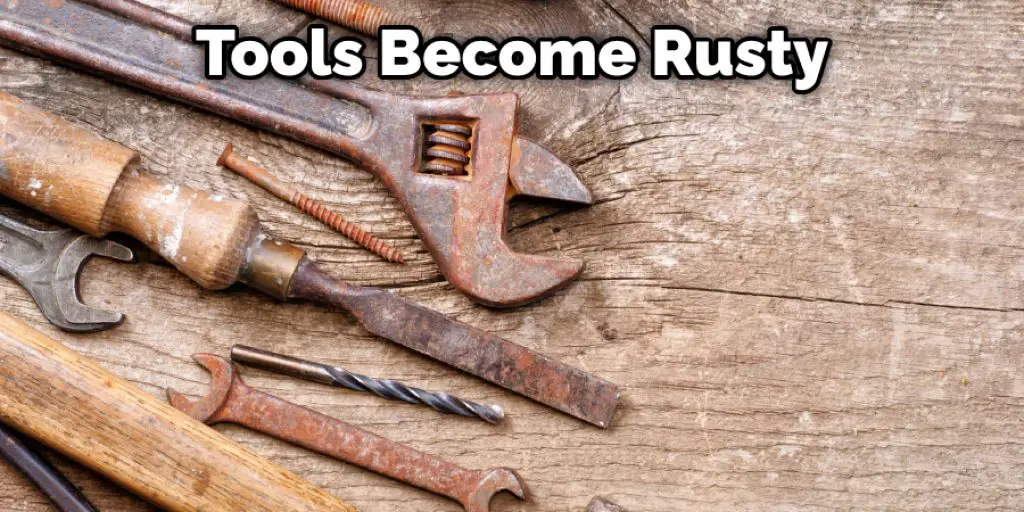
You can prevent rust in your garage by following these simple tips. By taking some basic precautions, you can keep your tools in good condition and protect them from the elements.
20 Effective Steps on How to Keep Tools From Rusting in Garage
Step 1: Control Humidity and Moisture Levels
The primary cause of rust on tools is moisture. To prevent rust, it is essential to control the humidity and moisture levels in your garage. Use a hygrometer to monitor humidity levels and aim to keep them below 50%. Use a dehumidifier, if necessary, to reduce humidity. Additionally, ensure proper ventilation by opening windows or installing vents or exhaust fans to promote airflow.
Step 2: Insulate and Seal the Garage
Insulate and seal your garage to maintain a stable temperature and prevent condensation. Inspect the garage for drafts, cracks, or leaks and seal them with weatherstripping or caulk. Consider insulating the walls and ceiling with materials such as fiberglass batts or foam board to maintain a consistent temperature and reduce the likelihood of condensation.
Step 3: Store Tools in a Dry Environment
Always store your tools in a dry, well-ventilated environment. Use storage solutions such as toolboxes, pegboards, or cabinets to keep your tools organized and off the ground. This will minimize their contact with moisture and reduce the likelihood of rust formation.
Step 4: Use Silica Gel Packs or Desiccants
Place silica gel packs or other desiccants inside toolboxes or cabinets to absorb moisture and reduce humidity. Replace the packs regularly or follow the manufacturer’s instructions for recharging or reusing the desiccant.
Step 5: Apply a Protective Coating
Apply a protective coating to your tools to create a barrier against moisture. This can include wax, oil, or specialized rust-preventive sprays. Follow the manufacturer’s instructions for application and reapply as needed to maintain the protective layer.
Step 6: Clean and Dry Tools After Use
After using your tools, clean them thoroughly to remove any dirt, grease, or debris that can trap moisture and lead to rust. Dry the tools completely before returning them to storage. If tools become wet during use or cleaning, be sure to dry them thoroughly to prevent rust formation.
Step 7: Use VCI (Vapor Corrosion Inhibitor) Products
VCI products, such as VCI paper, foam, or plastic bags, emit a vapor that forms a protective layer on metal surfaces, preventing rust. Store your tools in VCI products to provide long-term protection against rust, especially for tools that are not used frequently or are in long-term storage.
Step 8: Avoid Storing Tools in Damp or Wet Locations
Avoid storing your tools in damp or wet locations, such as directly on concrete floors, in damp basements, or near sources of moisture like water heaters or washing machines. These environments can increase the likelihood of rust formation on your tools.
Step 9: Regularly Inspect and Maintain Tools
Regularly inspect your tools for signs of rust or damage. If you notice any rust, address the issue immediately by cleaning the tool and applying a protective coating. By regularly maintaining your tools, you can prevent minor rust spots from becoming more severe and causing irreversible damage.
Step 10: Use Stainless Steel or Rust-Resistant Tools
If rust is a persistent issue in your garage, consider investing in stainless steel or rust-resistant tools. While these tools may be more expensive, their resistance to rust can make them a worthwhile investment in the long run.
Step 11: Install an Air Purification System
An air purification system can help to remove moisture and contaminants from the air in your garage, reducing the risk of rust on your tools. Consider installing an air purifier with a HEPA filter to maintain optimal air quality and reduce humidity levels.
Step 12: Keep a Regular Cleaning Schedule
Maintain a regular cleaning schedule for your garage to prevent the buildup of dust, dirt, and moisture. Sweep the floor, wipe down surfaces, and remove any debris that could trap moisture and contribute to rust formation. A clean, well-maintained garage will provide a better environment for tool storage and reduce the likelihood of rust.
Step 13: Create a Protective Barrier with Tool Wraps
Tool wraps made from materials such as waxed canvas, plastic, or corrosion-resistant fabric can provide a protective barrier between your tools and moisture. Wrap your tools in these materials before storing them to help prevent rust formation.
Step 14: Store Tools Separately from Corrosive Chemicals
Store tools separately from corrosive chemicals, such as fertilizers, pool chemicals, or cleaning supplies, which can emit vapors that contribute to rust formation. Use designated storage areas or cabinets for chemicals and tools to prevent cross-contamination and reduce the risk of rust.
Step 15: Utilize Rust Converter Products
If you notice rust on your tools, use a rust converter product to neutralize the rust and prevent it from spreading. Rust converters work by converting rust into a stable, protective coating that can be painted over or left as-is. Follow the manufacturer’s instructions for proper application and drying times.
Step 16: Maintain Proper Tool Organization
Proper organization can help prevent tools from coming into contact with moisture or other contaminants that can lead to rust. Use pegboards, magnetic strips, or tool racks to keep tools off the ground and separate from one another. This will allow air to circulate around the tools and reduce the likelihood of rust formation.
Step 17: Rotate Tool Storage
Rotate the storage of your tools periodically, especially if you have a large collection. This will ensure that all tools are exposed to air circulation and will help prevent moisture buildup in specific areas.
Step 18: Install a Vapor Barrier
If your garage is built on a concrete slab, consider installing a vapor barrier beneath the floor to prevent moisture from seeping up through the concrete and causing rust on your tools. This can be done during the construction of a new garage or retrofitted in an existing garage.
Step 19: Paint or Coat Metal Surfaces
Paint or coat metal surfaces, such as tool racks or storage cabinets, with a rust-inhibiting paint or coating. This will help protect these surfaces from rust and provide a safer storage environment for your tools.
Step 20: Educate Yourself on Proper Tool Care
Stay informed about proper tool care and maintenance techniques to prevent rust and prolong the life of your tools. Research the specific requirements for your tools and follow the manufacturer’s guidelines for cleaning, storage, and maintenance.
By following these steps and maintaining a proactive approach to rust prevention, you can protect your tools from rust and ensure their longevity. Regular inspection, cleaning, and the use of appropriate rust-prevention measures will help to keep your tools in excellent condition and ready for use whenever needed.
Types of Tools That Will Rust in a Garage
The following tools are susceptible to rusting when kept in a garage:
1. Iron:
Wrought iron and cast iron are particularly prone to rust. These materials are often used in tools because of their strength, but they require special care to avoid rusting. If you have any iron tools, coat them with a rust inhibitor or store them in a dry place.
You Can Check It Out To Hang a Deer in Garage
2. Steel:
Steel is a common material in many tools, and it is also susceptible to rust. However, there are a few ways to keep your steel tools from rusting. One way is to coat the steel in a thin layer of oil. This will create a barrier between the steel and the air, which will help to prevent rust.
Another way to prevent rust is to keep the steel clean and dry. This means that you should wipe down your tools after each use and ensure they are stored in a dry environment. If you live in a humid climate, you may want to consider using a dehumidifier in your garage to help keep the air dry.
3. Aluminum:
Aluminum is a metal that is not often used in tools, but it is susceptible to rusting. One way to prevent aluminum from rusting is to coat it with a protective sealant. This will create a barrier between the aluminum and the air, which will help to keep it from rusting. You can purchase a sealant at any hardware store.
You Can Check It Out To Get a Dent Out of a Garage Door
4. Copper:
Copper is a great metal to use to protect your tools from rusting. It is abundant and relatively cheap, and it has natural anti-rust properties. To use copper to protect your tools, simply coat the tool in a thin layer of copper sulfate. The copper will form a barrier between the metal and the air, preventing rust from forming.
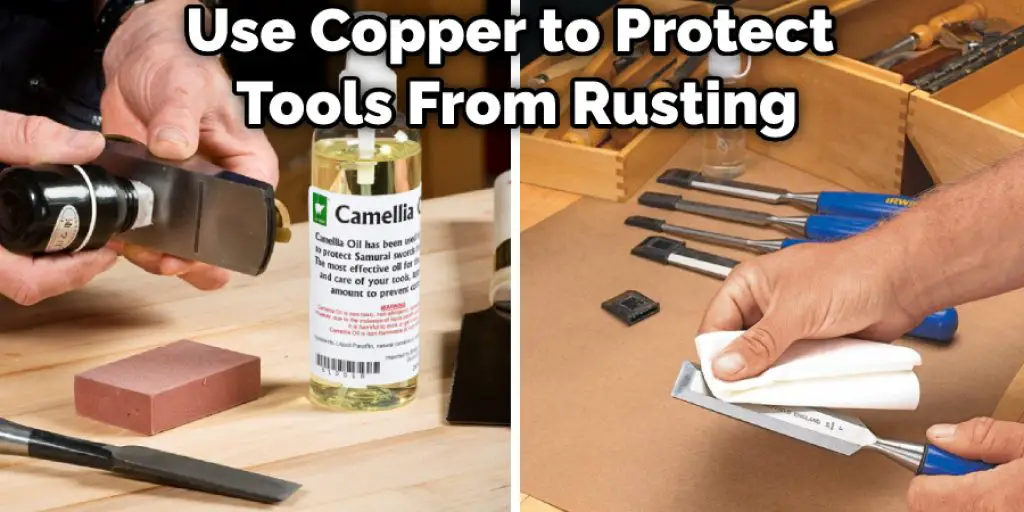
Some Helpful Tips to Store Your Tools Safely
Here we have given some tips on how to keep tools from rusting in garage.
- Always clean your tools and dry them off before storing them.
- If you can, store your tools in a dry place.
- Make sure your tools are stored securely so they can’t fall or be knocked over.
- Use a toolbox or storage rack to keep your tools organized and easy to find.
- Consider using a rust-preventative coating if you’re storing your tools for an extended period.
- Regularly inspect your tools for any signs of rust and take action to remove them as soon as possible.
- Inspect power tools and cords for any damage before storing them.
- Store small tools and parts in labeled containers to prevent them from getting lost.
Does WD-40 Stop Rust?
WD-40 is a multi-purpose product used for many things, including preventing rust. It is made of a mixture of oils and chemicals that help to lubricate and protect the metal from rust and corrosion. Rust is the result of the reaction between iron and oxygen in the presence of water.
When these three elements are combined, they form iron oxide, the red or orange substance you see on metal that has started to rust. WD-40 works by displacing the water and creating a barrier between the metal and the oxygen, preventing rust from forming.
Will Tools Rust in an Unheated Garage?
Tools will rust in an unheated garage, especially if they’re left out in the open exposed to moisture. To prevent this, you can either store them in a dry location or take measures to protect them from the elements. One way to protect tools from rust is to coat them with a layer of oil.
You can use motor oil, WD-40, or any other type of oil that will coat the metal and prevent moisture from seeping in. Another way to protect tools from rust is to store them in a plastic bag. This will help to keep them dry and free from moisture. If you have to store your tools in an unheated garage, take measures to prevent them from rusting.
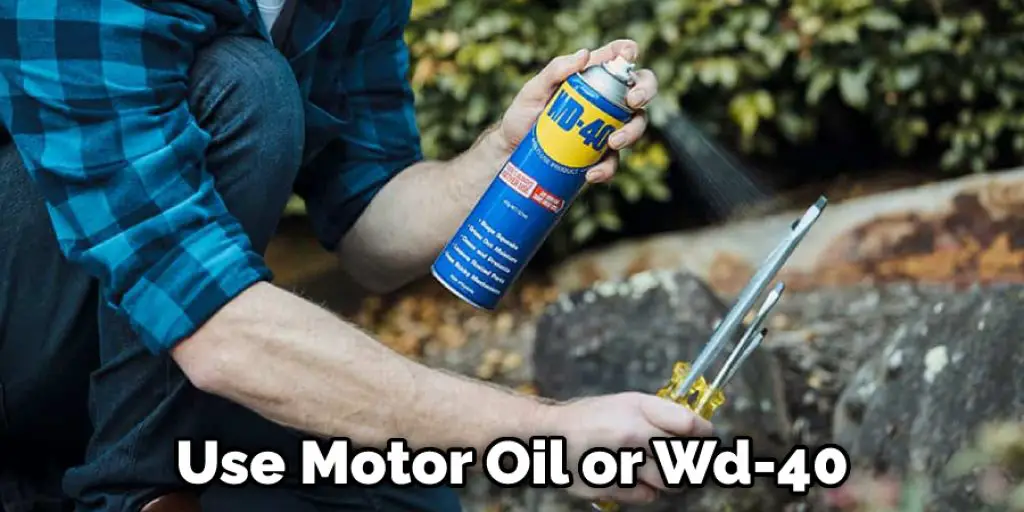
Conclusion
Properly maintaining your tools is the best way to keep them from rusting in your garage. By following a few simple tips, you can ensure that your tools are ready for use when you need them. In addition, regular cleaning and oiling will help protect your tools against corrosion and keep them looking like new.
We hope this blog post on how to keep tools from rusting in garage has been helpful. If you have any questions about maintaining your tools, be sure to consult the manufacturer’s instructions or contact us for assistance. Thanks for reading!
You May Also Read: How to Store a Motorcycle in a Garage

